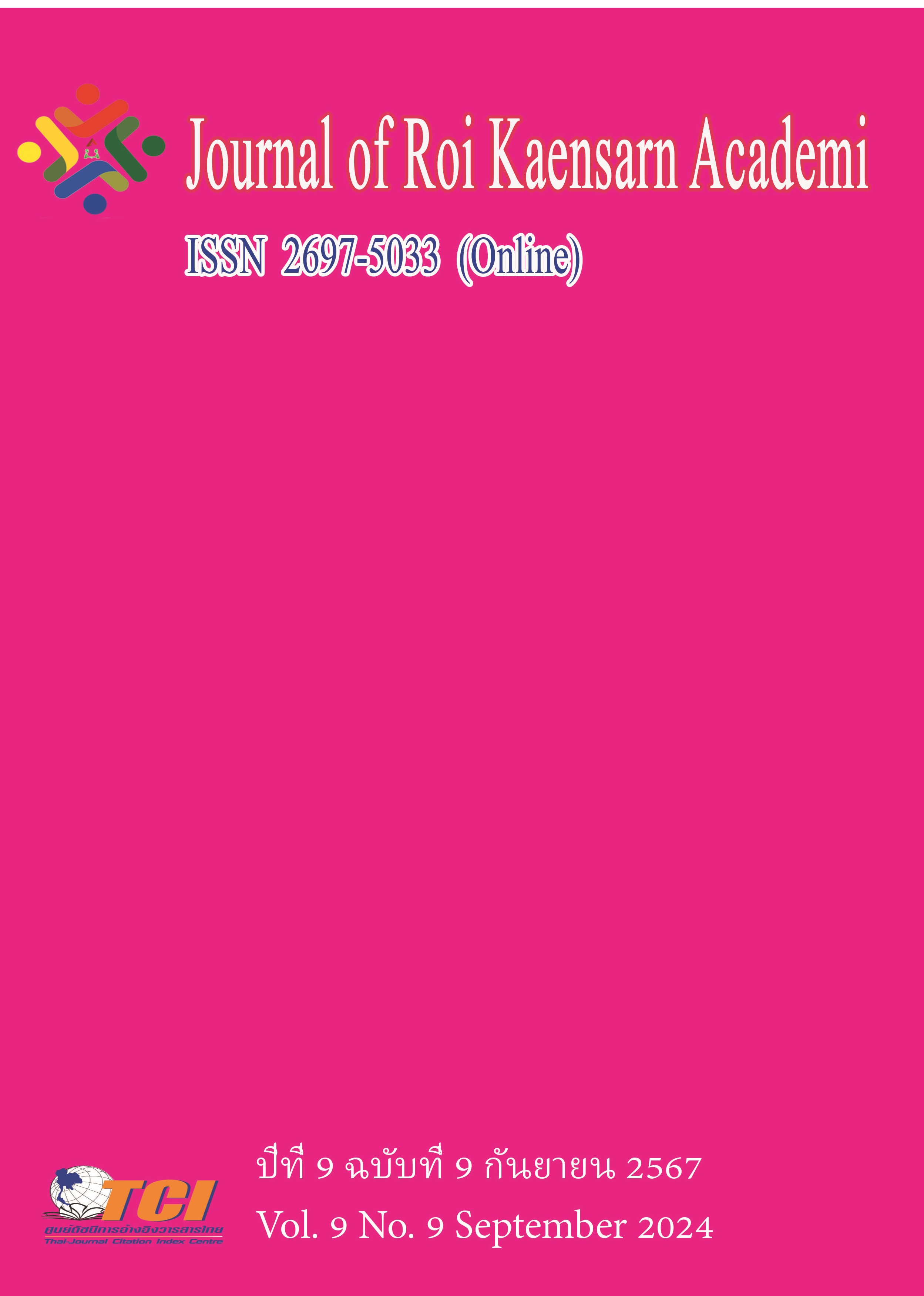Moderation and Mediation Effects of School Culture on the Relationship between Transformational Leadership and School Effectiveness of Public Art Vocational Schools in Shenyang City
Main Article Content
บทคัดย่อ
The objectives of this research were: (1) to study the effect of teachers’ transformational leadership on school effectiveness. (2) to find the mediation effect of school culture on the relationship between Transformational leadership, and School effectiveness, and (3) to find the moderation effect of school culture on the relationship between transformational leadership, and school effectiveness.
The target population of this study was the teachers in public art vocational schools in Shenyang city, The People’s Republic of China, and the population frame was the teachers in the 2024 academic year here are 4,108 teachers in 29 public art vocational schools in Shenyang city. The average number of students in each of these 29 public art vocational schools is more than 2,000. A stratified random sampling method was used to determine the sample size of 348 teachers. The tools used for data collection were semi-structured interviews and five-point rating scale questionnaires. Descriptive Statistics, CFA Confirmatory Factor Analysis, and Structural Equation Model (SEM) were used for statistical data analysis and content analysis.
The results show that: (1) teachers’ transformational leadership had positive effect on school effectiveness. (2) there was a mediation effect of school culture on the relationship between Transformational leadership, and School effectiveness, and (3) there was a moderation effect of school culture on the relationship between transformational leadership, and school effectiveness.
Article Details
เอกสารอ้างอิง
Andi, Samsir., Abdul, Muis. (2023). The Effect of Transformational Leadership and Organizational Culture Through Job Satisfaction and Work Motivation on Employee Performance. International Journal of Educational Administration, Management, and Leadership,.
Aslam, S., Shumaila, S., Azhar, M., & Sadaqat, S. (2013). Work-family conflicts: Relationship between work-life conflict and employee retention – A comparative study of public and private sector employees. Interdisciplinary Journal of Research in Business.
Bass, B. M., & Avolio, B. J. (1993). Transformational leadership and organizational culture. Public Administration Quarterly, 17 (1), , 112-121.
Bass, B. M., & Riggio, R. E. . (2006). Transformational leadership (2nd ed.). Mahwah, NJ: Erlbaum.
Brady. (2008). working towards a Model of Secondary school Culture. Canadian Journal of Education Administration and Policy, 26.
Cao, K. (2007). A Study on the Relationship between Teacher Organizational Citizenship Behavior and School Efficiency. Social Psychological Science, pp. 123-127.
Cavanagh. (2001). Toward a Model of Culture. Chicago.
ChengJinkuan. (2013). Improvement of School Efficiency from the Perspective of School Organizational Culture Research. Journal of Suzhou University, 15-20.
ChenXiaobin. (1999). Education Management. Beijing: Beijing Normal University Press.
Collier, Joel E. (2020). Applied Structural Equation Modeling Using AMOS. New York: Taylor & Francis.
Deal, T. E., & Peterson, K. D. (1999). Shaping School Culture: The Heart of Leadership. Jossey-Bass.
DengLiang. (2016). A Study on the Transformation of Weak Schools from the Perspective of School Culture: A Case Study of A Middle School. Basic Education Research, 16-18.
DuPing. (2012). Value added evaluation of the effectiveness of rural junior high schools: an empirical analysis based on survey data from five provinces in western China. Journal of Beijing Normal University (Social Sciences Edition), 45-50.
Erda, Murniarsih., et al. (2022). The Effect of Transformational Leadership of School Principles, Work Culture and Teacher's Work Commitment on Teacher Performance at State Junior High School. City of Banjarbaru. Journal.
Fan et al. (2004). Efficient organizational culture construction. Research on Higher Education in Science and Engineering, 19.
GuMingyuan. (2006). On the Construction of School Culture. Journal of Southwest University (Humanities and Social Sciences Edition).
Hallinger, P, & Heck, R. H. . (1998). Exploring the principal's contribution to school effectiveness: 1980-1995. School Effectiveness and School Improvement, 9 (2), 157-191.
Johnson, L. B. (2019). (2019). Title of the second article. Journal of School Effectiveness, 10 (2), 234-256.
Judge, T. A., & Piccolo, R. F. . (2004). Transformational and transactional leadership: A meta-analytic test of their relative validity. Journal of Applied Psychology, 89 (5), 755-768.
Kara, A. . (2022). The impact of school culture on teacher leadership. Educational Management Review, 39 (4), 567-590.
Khan, F. (2023). Transformational leadership and teacher work performance: Mediating effect of job autonomy and trust in school principal – insights from senior secondary school data in India. Educational Management Administration & Leadership.
Leithwood, K., & Jantzi, D. . (2005). Transformational leadership. B.(Ed.) Davies, The essentials of school leadership (31-33). London: Sage.
Muhammad, Aditia, Rizkie. (2022). The Effect of Transformational Leadership of School Principles, Quality Culture and Job Satisfaction on Teacher Performance. International journal of social science and human research.
Nassir, S., & Benoliel, P. . (2023). The relationship between teachers' transformational leadership and school effectiveness is moderated by school culture. Journal of Educational Leadership, 45 (2), 123-145.
Schein, E. H.(2010). Organizational culture and leadership (4th ed.). San Francisco, CA: Jossey-Bass.
Smith, J. A. . (2020). Title of the first article. Journal of Educational Leadership, 15 (3), 123-145.
SongZhongying. (2017). Practice and Reflection on Cultural Construction in Vocational Schools. vocational education.
SunMiantao. (2007). Two understandings on the standards and methods for evaluating school effectiveness. Two understandings on the standards and methods for evaluating school effectiveness. Research on Educational Development.
Tsai, Y. . (2011). Relationship between organizational culture, leadership behavior, and job satisfaction. BMC Health Services Research, 11 (1), 98.
Wang, Z. (2012, 5). The development process and inspiration of research on school effectiveness in the United States. Journal of Zhanjiang Normal University, pp. 22-27.
Wei-Chih, Lin. et al. . (2022). The Roles of Transformational Leadership and Growth Mindset in Teacher Professional Development: The Mediation of Teacher Self-Efficacy. Sustainability.
WenHengfu. (2007). Exploring the Basic Theoretical Issues of School Efficiency. Educational research, 12-16.
YuGuoliang. (1999). A New Discussion on School Culture. YuGuoliang, A New Discussion on School Culture. Hunan: Hunan Education Press .
ZhengJinzhou. (2003). Research Methods for School Education. ZhengJinzhou, Research Methods for School Education. Education Science Press.

